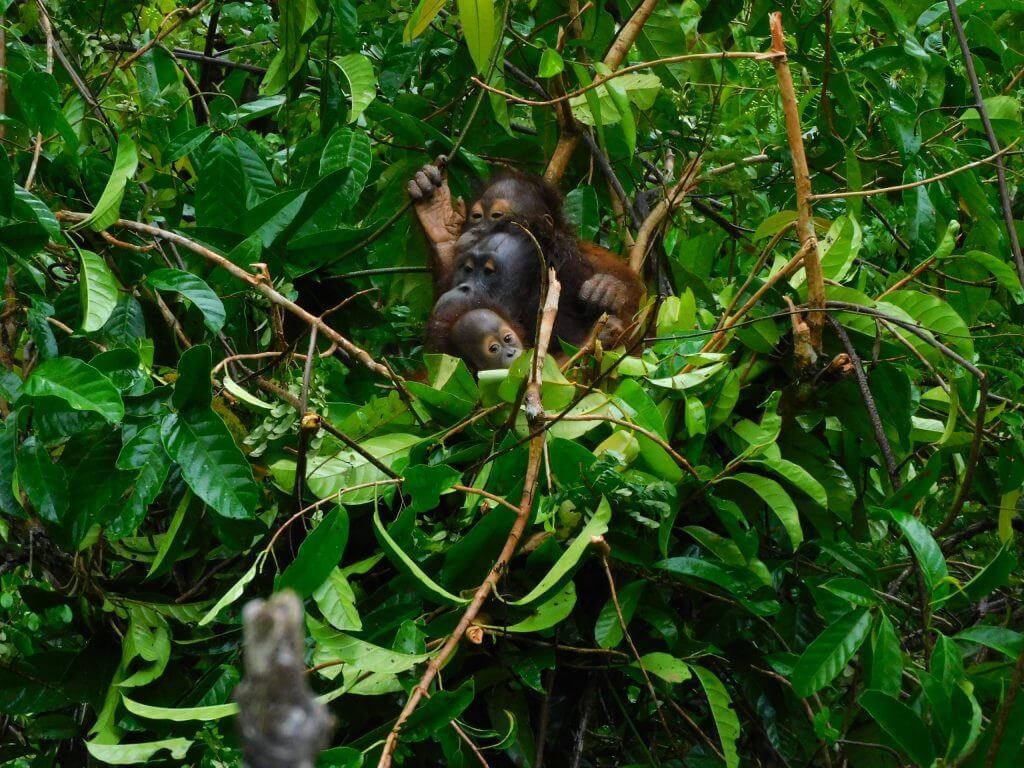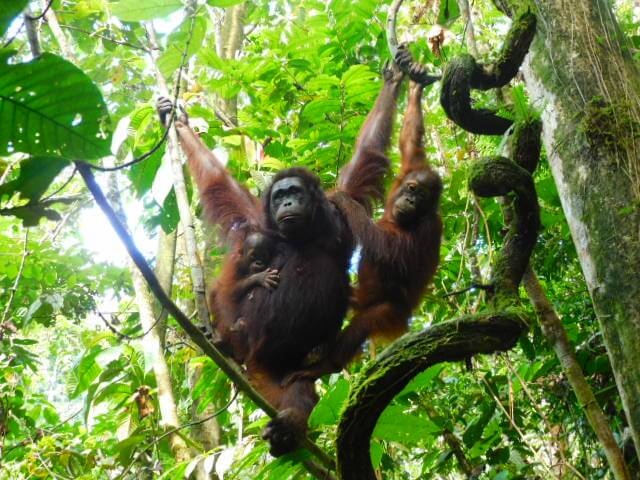Family party
Recently, our Post-Release Monitoring (PRM) team from Nles Mamse Camp, in the Kehje Sewen Forest, East Kalimantan, spotted three orangutans building nests only a few minutes’ hike from camp. What makes it so unique: It was Signe, her less than a year-old baby boy and her first-born son, six-year-old Bungaran. As a mother caring for young offspring, it would be quite natural if Signe had tried to shoo her older child away so that she could focus on her baby.
Signe had given birth to her first son when she was still at our Samboja Lestari Orangutan Rehabilitation Centre. We released both when Bungaran was 12 months old, at the end of 2016.
The morning after spotting the three orangutans, Kris and Yunus, two of our PRM team members, conducted nest-to-nest observations on Signe. Meanwhile, their colleagues Syahrul and Denny observed Bungaran. Nest-to-nest observations start when an orangutan moves out of their nest in the morning and ends once they enter their evening nest. It was just before 6 a.m. when the team arrived at the nest site, and, not long after, there was movement from both Signe’s and Bungaran’s nests. The team began to collect data on all the activities of Signe and her offspring that day.

Cuddle time!
After emerging from her nest, Signe quickly moved to another tree. She dangled on branches, moved through the canopy, breastfed her baby, took time to relax, and, at one point, even climbed down to the ground. The team observed Signe eating a healthy combination of natural foods: liana fibres and young leaves, forest oranges, young fig leaves, termites, forest ginger, and Calamus sp. tuber.
On average, Signe breastfed her baby every half hour. The male baby, whom we have yet to name, looked healthy and showed great interest in his mother’s activities. When Signe ate, he watched with extra attention. However, he didn’t get to taste test any of her food, as he is still too young to eat many of the foods that the forest has to offer.
Bungaran also spent most of his time up in the trees, eating. Like his mother, he too consumed various natural foods, including termites, Calamus sp. tuber, liana fibres and leaves, and forest ginger. Above all the others, however, Bungaran ate mostly mahang fruit (Macaranga sp.), and our team pondered over whether this might be his favourite forest food. Bungaran appeared completely indifferent to his human observers, as he did not approach them nor exhibit any signs of distress.

Proud mum Signe with her two sons.
Before sunset, Signe began to build a nest in a mahang tree and then rested in it with her baby. Bungaran soon joined the two in a nearby nest. Our PRM team members sat and waited for a while to ensure that the three had settled for the night before finally returning to camp.
The PRM team decided to repeat observations on Signe and Bungaran the following day. As with the previous day, Signe and Bungaran kicked off their daily activities shortly after 6 a.m. and stuck to a similar routine. Again, both were consuming a wide variety of forest food, including young leaves and liana fibres, rattan tubers, and several other plants.
The most interesting observation our team members made was Signe’s acceptance of Bungaran’s presence. On several occasions over the two days, Signe allowed Bungaran to get close to his younger brother. Last year, when we first spotted Signe’s newborn, Bungaran was nowhere to be seen. Thus, this was the first time our team witnessed an interaction between the two brothers.
The team concluded the second day of observations on a positive note, knowing that Signe and her two offspring are thriving in the Kehje Sewen Forest. While Bungaran is learning how to live independently, it appears he is still benefiting from – and enjoying – occasional proximity with his mother. However, we sincerely hope Bungaran will be showing even more signs of independence the next time we observe him.
We wish all three a healthy and happy life in the Kehje Sewen Forest!





